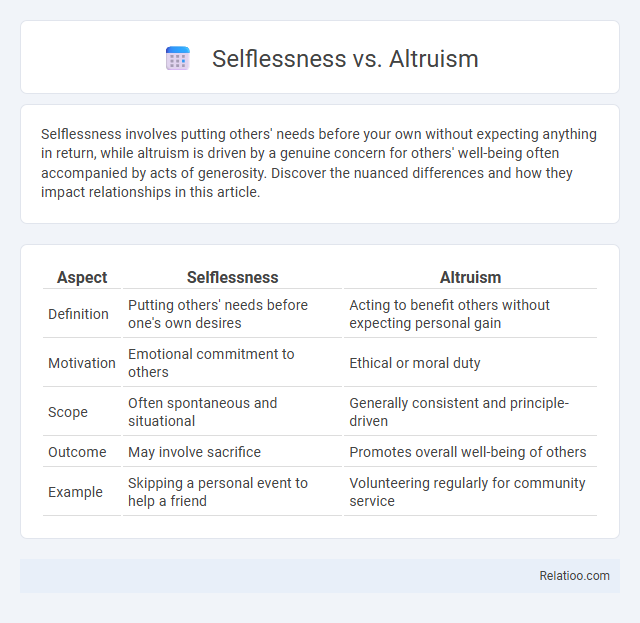Selflessness involves putting others' needs before your own without expecting anything in return, while altruism is driven by a genuine concern for others' well-being often accompanied by acts of generosity. Discover the nuanced differences and how they impact relationships in this article.
Table of Comparison
| Aspect | Selflessness | Altruism |
|---|---|---|
| Definition | Putting others' needs before one's own desires | Acting to benefit others without expecting personal gain |
| Motivation | Emotional commitment to others | Ethical or moral duty |
| Scope | Often spontaneous and situational | Generally consistent and principle-driven |
| Outcome | May involve sacrifice | Promotes overall well-being of others |
| Example | Skipping a personal event to help a friend | Volunteering regularly for community service |
Defining Selflessness and Altruism
Selflessness is characterized by prioritizing others' needs above one's own without expecting anything in return, embodying an intrinsic disregard for personal gain. Altruism involves intentional actions aimed at benefiting others, often motivated by empathy or moral principles, and can include some degree of self-sacrifice. Both concepts intersect in promoting others' welfare, but selflessness emphasizes a mindset or attitude, whereas altruism focuses more on concrete behaviors driven by concern for others.
Historical Origins of Selflessness and Altruism
Selflessness and altruism have distinct historical origins rooted in philosophical and religious traditions dating back to ancient civilizations, where selflessness emerged from spiritual teachings promoting the transcendence of ego for collective well-being, while altruism was first articulated by 19th-century philosopher Auguste Comte as a conscious concern for others' welfare. Your understanding of these concepts deepens by exploring how selflessness intertwines with concepts of virtue in Eastern philosophies like Buddhism, contrasting with altruism's emphasis on social and ethical responsibility in Western thought. The historical evolution of selflessness and altruism highlights their foundational roles in shaping moral frameworks that encourage prioritizing others' needs over personal gains.
Key Differences Between Selflessness and Altruism
Selflessness involves prioritizing others' needs over your own without expecting anything in return, often stemming from compassion or empathy. Altruism specifically refers to actions taken to benefit others even at a personal cost, highlighting intentional sacrifice for the welfare of others. The key difference lies in selflessness being a broader mindset, while altruism emphasizes deliberate, self-sacrificing behavior aimed at helping others.
Psychological Foundations of Each Concept
Selflessness involves prioritizing others' needs without consideration for personal gain, rooted in empathy and moral development within psychology. Altruism differs by emphasizing intentional actions meant to benefit others, often driven by intrinsic motivation and social norms. Understanding your own psychological foundations can clarify when behaviors stem from genuine concern versus cultural or evolutionary influences.
Motivations Driving Selflessness vs Altruism
Selflessness involves acting without concern for personal gain, often motivated by empathy or moral duty, whereas altruism is driven by the genuine desire to benefit others, even at a personal cost. Your motivations for selfless behavior may stem from internal values or social expectations, while altruistic actions are typically fueled by compassion and a sense of interconnectedness. Understanding these distinctions helps clarify why you choose to prioritize others' needs over your own in different contexts.
Ethical Implications in Daily Life
Selflessness involves prioritizing others' needs without expecting anything in return, often driven by empathy and moral duty, whereas altruism emphasizes voluntary acts that benefit others, sometimes at a personal cost, reflecting ethical principles of beneficence and fairness. The ethical implications in daily life include balancing self-care with concern for others, ensuring that acts of kindness do not lead to burnout or exploitation, and fostering genuine social responsibility without undermining individual well-being. Understanding these distinctions helps cultivate ethical decision-making, promoting a community-oriented mindset while respecting personal boundaries.
Cultural Perspectives on Helping Others
Cultural perspectives on helping others shape the interpretations of selflessness, altruism, and egoism, where collectivist societies often emphasize altruism through communal support and sacrifice for group well-being. In contrast, individualistic cultures might prioritize selflessness as personal moral integrity or egoism aligned with self-interest balanced by social norms. Cross-cultural studies reveal that altruistic behavior is deeply influenced by cultural values, social expectations, and the definition of the self in relation to others.
Self-Sacrifice: When Does It Become Harmful?
Self-sacrifice, often seen as a noble form of selflessness and altruism, becomes harmful when it leads to neglecting your own well-being or enables unhealthy dependencies. True altruism balances giving with self-care, ensuring that acts of kindness do not compromise personal health or emotional stability. Recognizing the limits of self-sacrifice prevents burnout and maintains the sustainability of helping others effectively.
The Role of Self-Interest in Altruistic Acts
Selflessness and altruism often overlap, yet selflessness implies acting without regard for personal gain, while altruism includes actions benefiting others which may still fulfill an underlying self-interest. Your understanding of altruistic acts should recognize that self-interest can drive such behaviors by providing emotional rewards or social recognition. This nuanced perspective highlights that selflessness is not always void of self-interest, but rather a complex interplay enhancing human social bonds.
Fostering Selflessness and Altruism in Society
Fostering selflessness and altruism in society involves encouraging individuals to prioritize others' well-being through acts of kindness and empathy, which enhances communal harmony and social trust. Your role in modeling compassionate behavior and promoting educational initiatives on empathy can cultivate a culture where helping others is valued over personal gain. Societies that emphasize altruistic values experience stronger social bonds, reduced conflicts, and improved collective resilience.

Infographic: Selflessness vs Altruism
 relatioo.com
relatioo.com